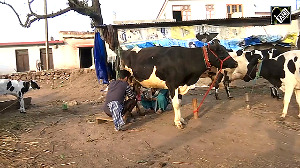United States President Barack Obama will visit India this summer, making him the first US President to visit India in the first two years of his first term in more than 30 years, senior administration officials and diplomatic sources have told rediff.com.
The only other US president in recent times who visited India in his first term (and his only term) was President Jimmy Carter, but Obama administration officials discreetly pointed out that Carter was almost into his third year of presidency when he went to New Delhi, but Obama would like to visit India half-way through his second year in office.
During a joint press conference with Prime Minister Manmohan Singh on November 24, Obama while describing Dr Singh as a 'a wise leader' and 'a man of honesty and integrity', had said, "I have happily accepted his gracious invitation to visit India next year."
Twenty two years after Carter's visit, President Bill Clinton visited India in March 2000, in the last year of his second term. His successor President George W Bush made it to New Delhi in 2006, more than two years into his second term.
"No dates have been nailed down yet," said sources. They added that a visit in summer, when the US Congress is in recess and no contentious domestic issues are being discussed and negotiated "has been agreed to in principle."
According to the sources, more details regarding the finalisation of dates will be discussed when Dr Singh arrives in Washington, DC on April 12 on a two-day visit, on the invitation of Obama, to attend the Global Nuclear Security Summit hosted by the White House. The meet will also be attended by over 40 world leaders.
During the sidelines of the summit, Under Secretary of State for Political Affairs William Burns and Foreign Secretary Nirupama Rao, as well as senior officials in the Prime Minister's Office, including new National Security Adviser Shiv Shankar Menon, will discuss convenient dates for the Obama visit and also try to reach a conclusion on the civilian nuclear agreement, said sources. They added that the US President will be in India for two-three days, during which he and Dr Singh might initial the nuclear deal.
During a joint press conference with Obama at the White House on November 24, Dr Singh said that Obama had assured him of his 'full and complete' commitment to the implementation of the nuclear deal.
"It's only a question of the i's and t's to be crossed. I am confident and I have the assurance of the President that this process will be over without further loss of time," Dr Singh said.
The next day, at a press conference for Indian journalists, Dr Singh repeated the assurance he had received from Obama and said the deal would be completed in "a couple of weeks". But even after three months, there are no signs of the implementation of the deal, which has been strongly criticised by the Opposition parties in India.
The US' demand -- that India become a party to the Convention on Supplementary Compensation for Nuclear Damage which is a pre-requisite for American firms to engage in nuclear trade with India -- has been all but completed, said sources. But India's insistence that a clear-cut agreement be concluded on a reprocessing facility in India before New Delhi signs contracts with US nuclear firms has further stalled the deal.
Over the next few months, both Burns and the State Department's technical and legal teams will make several visits to New Delhi and their counterparts will visit Washington to make sure the deal can be completed and initialed when Obama visits India in summer. The Obama administration is becoming sensitive to concerns in New Delhi and strong criticism from the Republicans about its inability to implement the deal so far.
Critics have argued that Dr Singh's state visit in November, while high on symbolic value and full of photo-ops, lacked in substance.
In a recent interview, Karan Bhatia, who was the highest ranking Indian American in the Bush administration, told rediff.com, "The defining element of the US-India relationship in the last five years has been the nuclear agreement, and that's still not implemented."
Earlier, Congressman Ed Royce, California Republican and ranking GOP member on the House Foreign Affairs Committee and co-chair of the Congressional Caucus on India and Indian Americans, also expressed deep disappointment over the fact that the remaining paperwork on the nuclear deal wasn't completed in time to make it the lead highlight of Dr Singh's state visit.






 © 2025
© 2025